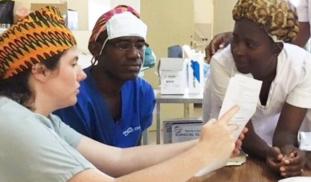Please wait...
About This Project
Women with obstetric fistula experience chronic leaking urine, leading to stigma, isolation, and loss of income. (Wall, 2006) Repair is possible, but only 2% of the two million affected women ever access surgery, and 50-100,000 new cases occur each year. (UN, 2014) Women and girls are in dire need of a new solution to manage their injury. For this project, we will interview Ghanaian women with fistula to study stigma, coping, and acceptability of a non-surgical method for fistula management.

Browse Other Projects on Experiment
Related Projects
Managing Life with Chronic Urine Leakage and Stigma: What Do Women in Ghana Think About an Innovation to Support Coping?
Women with obstetric fistula experience chronic leaking urine, leading to stigma, isolation, and loss of...
Can a Meal Replacement Help Solve Hunger in America?
In the United States, hunger is commonplace. 42 million Americans struggle to get the healthy foods they...
Evaluating women’s experiences with a referral system for safe and legal abortion care on the Thailand-Burma border
Decades of conflict and stalled economic development in Burma have led to mass population displacement...





